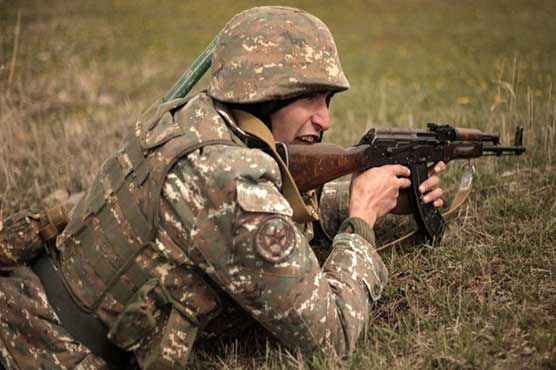Nine soldiers dead in fighting on Armenia-Azerbaijan border

The ex-Soviet republics have been locked in a simmering conflict for decades
BAKU (AFP) - At least nine soldiers were killed on Tuesday in a third day of fighting between Azerbaijan and Armenia, despite international calls for restraint.
The fighting between the arch-foes in the South Caucasus since Sunday is the heaviest in years, raising fears of a major flare-up in the volatile region.
Azerbaijan said seven of its soldiers had died on Tuesday, including two senior officers, and Armenia said two of its troops had been killed, its first reported fatalities in the clashes.
The ex-Soviet republics have been locked in a simmering conflict for decades over Azerbaijan s southwestern separatist region of Nagorny Karabakh, which was seized by ethnic Armenian separatists in a 1990s war that claimed 30,000 lives.
Fighting outside the region is rare, but since Sunday the two sides have reported clashes in northern areas along their shared border.
Azerbaijan s defence ministry said Armenian forces had attacked its positions in the northern Tovuz region with artillery fire, mortars and large-calibre machineguns on Tuesday. It said several villages in the area had also come under fire.
Deputy Defence Minister Karim Valiyev told state television that a major general, a colonel and five other servicemen had "heroically died in action" on Tuesday -- bringing the total number of Azerbaijani soldiers killed since Sunday to 11.
The Azerbaijani foreign ministry also said one civilian was killed in an artillery strike on a village in Tovuz region.
Armenia accused Azerbaijani forces of opening fire again on the northeastern section of the border in its Tavush province, with defence ministry spokesman Sushan Stepanyan saying a major and a captain had been killed.
The Armenian foreign ministry also accused Azerbaijan of using drones to attack civilian sites in the town of Berd in Tavush.
"This aggression against the security of the civilian population of Armenia will receive a proportionate response, for which the Azerbaijani side bears full responsibility," foreign ministry spokeswoman Anna Naghdalyan said in a statement.
Baku will retaliate
The fighting on the northern border -- hundreds of kilometres from Nagorny Karabakh -- has prompted calls for an immediate ceasefire from the United States, European Union and Russia, while Azerbaijan s ally Turkey expressed support for Baku.
"We are deeply concerned about the exchange of fire on the Armenian-Azerbaijani border," Kremlin spokesman Dmitry Peskov told reporters after the latest clashes on Tuesday, calling on "both sides to show restraint".
Azerbaijani political analyst Elhan Shahinoglu said the probability of a full-scale war was now "very high".
"An Azerbaijani general has been killed and Baku will retaliate," he said.
"There is a widespread popular demand in Azerbaijan to shift military actions to Karabakh."
But Armenian analyst Hakob Badalyan said an all-out war was very unlikely.
"Baku and Yerevan, as well as the region s geopolitical powers (Russia and Turkey), don t want a big war which they know will lead to catastrophic consequences," he said, adding that neither side was in a clear position to win a protracted conflict.
Four years ago, Azerbaijan had military superiority over its neighbour, but Armenia has since "restored the balance" with purchases of sophisticated Russian weapons, he said.
Mediated by the "Minsk Group" of diplomats from France, Russia and the United States, talks on the Karabakh conflict have been largely stalled since a 1994 ceasefire deal.
Armenia, which has close political and military ties with Russia, controls the disputed region and has vowed to crush any attempt to take it back.
But energy-rich Azerbaijan, whose military spending exceeds Armenia s entire state budget, has repeatedly threatened to restore control over the territory by force.
In 2016, deadly clashes in Karabakh nearly spiralled into full-scale war.

